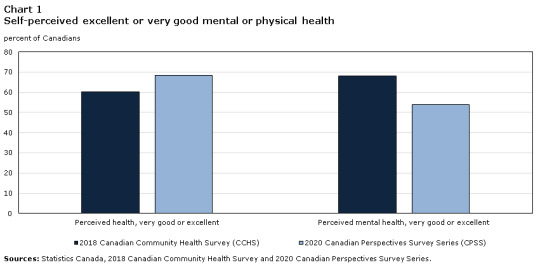Text
Mental health during COVID-19

During the COVID-19 global pandemic, 54 percent of Canadians aged 15 and older posted excellent or very good mental wellbeing, according to the latest Canadian Perspectives Survey Series (CPSS). In comparison, 68 percent of Canadians aged 15 and older said their mental health was outstanding or really strong in the 2018 Canadian Community Health Survey (CCHS). Sixty-nine percent of Canadians said their physical health was excellent or very good in 2018, compared to 60 percent in 2018. (See chart above).
---
» Youth are less likely to say their mental condition is excellent or really good.
During the COVID-19 period, all age ranges were less likely to have excellent or very good mental wellbeing, with the exception of those 65 and older. The disparity between 2018 and 2020 was more noticeable among younger adults. For example, during the pandemic, 42% of those aged 15 to 24 recorded outstanding or very good mental wellbeing, compared to 62% in 2018.
---
These findings show that the general mental health of Canadians has deteriorated as a result of the COVID-19 pandemic. Based on contrasts between the 2020 CPSS and the 2018 CCHS, women and young Canadians' self-perceived mental health was especially impacted.
In response to COVID-19, studies have indicated that a combination of mental health interventions, including remote and mental health tools while physically separating, may be an alternative for addressing some of the population's mental health needs.
1 note
·
View note
Text
What is the difference between mental health and mental illness?
Our emotional, psychological, and social well-being are all part of our mental health. It has an effect on the way we think, behave, and act. It also influences how we deal with pressures, interact with others, and make good decisions. Our mental wellbeing is critical at all stages of life, including infancy, puberty, and adulthood.
Depression, anxiety, bipolar disorder, and schizophrenia are examples of mental disorders that impair a person's thought, feeling, disposition, or behaviour. These symptoms can be short-term (acute) or long-term (chronic), and they can impair a person's capacity to interact with others and work on a daily basis.
0 notes
Text
Why is our mental health important?
Both mental and physical wellbeing are essential components of general well-being.
Mental health used to be a controversial topic in society, and it still is for many people – something that can not be discussed or shared. Not any more. It is impossible to overstate the value of talking about mental health. For starters, mental wellbeing has a major impact on the majority of your body's physical well-being. In addition, poor physical fitness will have an adverse effect on your mental health.
» How does our mental health affect our body?
While most people equate mental wellbeing solely with the brain and how it affects a person's emotions, it may also have serious physical consequences. Mental health illnesses can cause high blood pressure, an increased risk of heart disease, and an accelerated heart rate, to name a few. That is why it is important that those who are struggling should not suffer alone.
» How does our physical health affect our mental health?
It's also crucial to remember that poor physical fitness can have an effect on your emotional health; constant pain and limited mobility can contribute to depression and anxiety. You should take steps to lessen the chances of having mental health problems. Physical exercise has a number of wellness advantages, including improving your mood and lowering your stress levels. Healthy eating can also assist with mental wellbeing, showing that leading a safe and healthy lifestyle can help with mental health symptoms. The goal is to be as healthy as your body requires, but still maintaining that you're aligning and balancing your physical and mental fitness with the healthiest version of yourself!
0 notes
Text
How we can help others

If you know or recognize someone who might be dealing with a mental health issue, you may contact them politely and inquire about their well-being, as well as listen to them. Listening can be very beneficial.
It's important to demonstrate empathy by putting yourself in their shoes by demonstrating that you care and understand that they're going through a tough time. Depending on what the individual said, you can inquire if there is something you can do to assist them. If they are willing to help, often assisting a patient or loved one in making a doctor's appointment, reviewing pertinent details on the website, and bringing them to the doctor will put them on the road to rehabilitation. After all, we already do all of the above with someone who is afflicted by a medical ailment. It shouldn't be any different for someone who is dealing with a mental health issue. So please lend a hand by listening, acknowledging, and accepting
0 notes
Video
Healthy coping mechanisms
0 notes
Text
Suicide statistics and prevention
***TRIGGER WARNING: Discussion about suicide

Suicide is a very sensitive topic to openly talk about and so how are we able to discuss it? With suicide rates going up, it needs to be faced head-on. People who are suicidal, they don’t necessarily have to show that they aren’t doing alright. Most of the times, people who want to take their own life put up a front. People such as a friend who always seems so strong, or an uncle who just wants to make people happy. There is no certainty as to who is suicidal and who isn’t. Checking up on people you care about wouldn’t hurt anyone. Be there for those you love qand if you are struggling with suicidal thoughts or are attempting to do so, reach out to someone. You are not alone.
Phone number to Canada’s suicide prevention service: 833-456-4566
0 notes
Text
How common is mental health disorders?
***TRIGGER WARNING: Mentions suicide
This may not be known, but mental health is very comon amongst Canadians. Statistically speaking:
1) About half of the population would have or have had a mental disorder by the age of 40.
2) Anxiety disorders affect 5% of the population, resulting in moderate to extreme disability.
3) Suicide is responsible for 24% of deaths among 15-24 year olds and 16% of deaths among 25-44 year olds.
4) From puberty to middle age, suicide is one of the leading causes of death in both men and women.
5) The suicide rate among men is four times higher than that of women.
3 notes
·
View notes
Text
Mental health facts in Canada, part two
1) About 20% of people will suffer from a mental disorder at some point in their lives.
2) An estimated 80% of people would be directly impacted by a mental disorder in a family member, neighbour, or coworker.
3) The majority of mental disorders begin in adolescence or early adulthood.
4) Mental illness is caused by a variety of complex causes, including genetic, biological, personality, and environmental factors.
5) Mental disorders should be treated efficiently.
6) Mental illness is expensive for patients, families, the healthcare system, and society as a whole.
7) It is estimated that the economic burden of mental disorders in Canada exceeds $50 billion.
8) The stigma associated with mental illness is a significant obstacle to not only diagnosis and care, but also societal acceptance.
0 notes
Text
Mental health facts in Canada, part one
1) Mental illness has an indirect impact on all Canadians at some point in their lives, whether it be through a family member, a friend, or a coworker.
2) One out of every five Canadians will experience a mental health condition or disease in any given year.
3) Mental illness affects people of all ages, educational levels, socioeconomic status, and cultural backgrounds.
4) About 8% of adults will suffer from major depression at some point in their lives.
#mental health awareness#mental health#mental heath support#mentalwellness#facts#mental health facts
0 notes
Text
The meaning behind the semicolon

A semicolon is a punctuation mark that connects two complete sentences that are similar. A semicolon is used instead of a pause because two sentences are so closely related that a period would be so much of a break. In other words, a semicolon indicates that the idea isn't over yet, even though the sentence is.
Project Semicolon, a non-profit devoted to increasing awareness of mental health, self-harm, suicide, and addiction, was founded on this sentiment. The organization's motto, reads, "A semicolon represents a sentence the author could have ended but chose not to." In this case, "You are the author, and the sentence represents your life."
Amy Bleuel founded Project Semicolon in 2013 as a means to encourage people suffering from depression, suicidal ideation, or self-harm to share their stories and realize they are not alone. The initiative began as a social media campaign, encouraging people to draw a semicolon on their wrist in unity, photograph it, and share it with others. Now, people are getting semicolons tattooed on themselves and the awareness of semicolons is premiering more and more in our society, including TV shows such as 13 Reasons Why.
6 notes
·
View notes